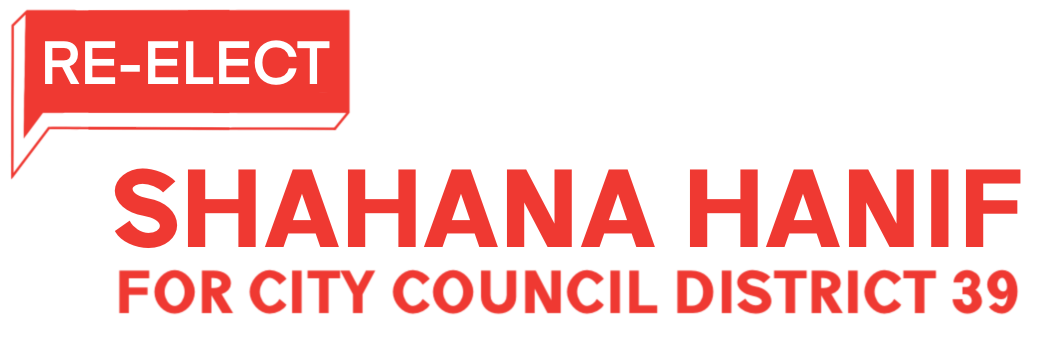COMMUNITY INVESTMENT IN SMALL BUSINESS
As the daughter of a Bangladeshi restaurant owner, Shahana knows that running a small business in Brooklyn was hard enough before the pandemic, as our city provides insufficient protections for working-class small business owners fighting rising rents, gentrification, and big-box retail and chains. Now, nearly a third of our City’s beloved small businesses are at risk of closing for good, particularly businesses that serve communities of color and LGBTQ+ New Yorkers. Our COVID-19 recovery must center immediate relief for small businesses — from immigrant-owned restaurants to queer nightlife and arts venues. Shahana will fight to keep our neighborhoods thriving by making Open Streets permanent, expanding open art and music performances across the district, and ensuring small businesses have the resources they need to safely reopen.
As Council Member, Shahana will...
+ Expand protections for small business
- Introduce a commercial rent relief bill to stabilize rent for small businesses and creates an independent rent control board for commercial spaces. The rent control board will incorporate community members, especially community members of color and immigrants.
- Provide local businesses (particularly those owned by people of color and immigrants) impacted by COVID-19 with financial support, like the Mayor’s Small Business Emergency Grant Program.
- Host COVID-19 relief workshops to teach business owners how to obtain resources, apply for certifications, and access post- COVID-19 relief programs. Workshops and information will be hosted in multiple languages.
- Partner with the Mayor’s Office of Minority and Women-owned Business Enterprises (M/WBE) to streamline the application process and increase outreach to eligible businesses.
- Support community members who want to invest in their own communities to prevent gentrification. Support by:
- Reinvesting in youth employment opportunities, like the Student Youth Employment Program (SYEP).
- Expanding CUNY Service Corp to provide CUNY students with internships at small businesses.
- Investing in entrepreneur mentorship programs and workshops for New York City public school students, especially underfunded schools in predominantly Black and brown neighborhoods.
- Hosting block parties with BIPOC owned local businesses in the district.
- Expand the Department of Small Business Services’s contract with legal organizations to provide more small business owners and employees access to legal counsel.
- Introduce legislation to repeal Nuisance Abatement Laws (NALs). NALs historically weaponize immigrant-owned businesses by monitoring and policing Black communities. In cases where business owners, employees, or concerned community members suspect legitimate fraud, trafficking, or other public safety issues, City Council should create a fraud hotline with the NYC Department of Small Business Services to connect constituent liaisons within the Council office should field and direct calls to appropriate city agencies, not the police.
- Work with State leaders to cancel commercial rent for New York City’s small businesses.
- Urge the Department of Small Businesses to use a neighborhood median level of income rather than zip code median level of income when determining pandemic small business relief.
- Provide PPE and cleaning resources to bars, nightclubs, and other nightlife venues.
- Incentivize local businesses to participate in community solar projects.
+ Make outdoor dining, culture, and arts permanent
- Make outdoor dining a permanent option for restaurants, and partner with urban designers to provide both free infrastructure for outdoor dining and workshops to help restaurants stay in compliance with Department of Health guidelines.
- Suspend enforcement of fines for unlicensed street vendors. Street vendors are central to outdoor dining and accessible, open streets.
- Host workshops to guide smaller arts organizations through the Open Culture permit process.
- Expand open culture legislation to provide funding for art venues. Support outdoor performances with discretionary funding prioritizing venues and institutions that serve immigrant and New American communities.
- Contract with local restaurants to provide Halal and Kosher meals to community fridges.
- Provide subsidies for arts institutions and venues to become ADA accessible, particularly those that service seniors.
- Remove police from Open Streets.
- Partner with temporarily vacant art and theater venues to host mutual aid and food drop-off.
- Expand Open Streets to more working-class neighborhoods of color, which are currently underserved by the Open Streets program.
- Partner local small businesses with the Department of Transportation’s Temporary Public Art Program to create murals and public art to create a beautiful outdoor dining experience.
